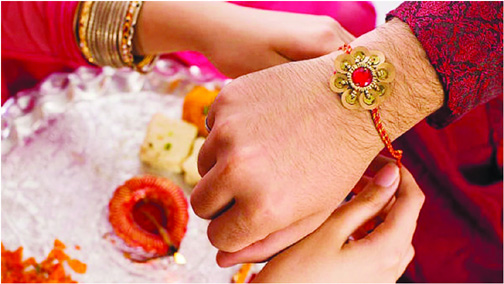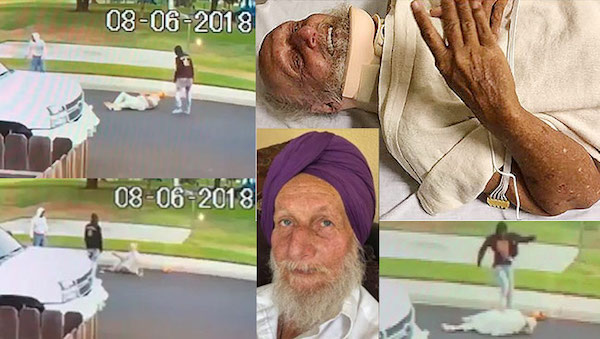
Raksha bandhan is the main festival of Hindus which is celebrated on the full moon day of Shravan and every year the festival comes in August. This festival is celebrated throughout India and Nepal. Raksha bandhan means ‘bondage of security’ and ‘Raksha Bandhan’ in Sanskrit literally means “the knot of security”. Rakhi can be made from cotton such as kalva, silk thread, and gold or silver item. The festival of Raksha Bandhan is the festival of brother and sister. This festival symbolizes the love of brother Sister. On the Raksha bandan, sister prays for her brother’s long life with her prosperity and happiness and binds Rakhi on her brother’s wrist. The brother gives the gift to his sister and promises to protect his sister and take care of him in all circumstances. This festival is celebrated by the Hindu communities including Jain and Sikh religion and other parts of the world. Raksha bandhan has also been an important tradition in the history of Sikhism, which is sometimes called Rakhdi or Rakhri.
The Significance
Raksha Bandhan is now considered as a day to celebrate the sacred relation of a brother and a sister. Yet there have been examples in history where in rakhi has just been a raksha or protection. It could be tied by wife, a daughter or mother. The Rishis tied rakhi to the people who came seeking their blessings. The sages tied the sacred thread to themselves to safe guard them from the evil. It is by all means the ‘Papa Todak, Punya Pradayak Parva’ or the day that bestows boons and end all sins as it is mentioned in the scriptures.
Previously, Rakhi festival encompasses the warmth shared between the siblings but now it goes way beyond it. Some people tie Rakhi to neighbours and close friends signifying a peaceful co-existence of every individual. Rakhi Utsav was first popularized by Rabindranath Tagore to promote the feeling of unity and a commitment to all members of society to protect each other and encourage a harmonious Social life.
In today’s scenario, the day has a different perspective. The occasion involves a pledge of life-time practice of moral, cultural and spiritual values. The values and the sentiments attached to the rituals of this festival are worth inculcating by the whole human race, the sentiments of harmony and peaceful coexistence. The festival of Raksha Bandhan assumes all forms of Raksha or protection, of righteousness and destroyer of all sin. The ritual of Rakhi tying has become so important that come what may, brothers and sisters try to visit each other place on this particular day tin order to bring back the oneness of the family, binding the family together in an emotional bond of love. Around mid-August, Hindus all over the world celebrate Raksha bandhan. “Raksha” means protection, and “bandhan” means bound or binding. In North India, the occasion is popularly called Rakhi, Raksha Bandhan or Rakshaa Bandhan- the tying of an amulet.
In ancient times a woman tied a ‘rakshaa’ on her husband’s wrist to protect him from evil. Gradually this changed; she tied a ‘rakshaa’ on her brother’s right wrist, to protect him from evil influence and those factors which may taint his character, and to strengthen the bond of sibling love between them. On the occasion of Rakshaa Bandhan she visits her brother’s home and performs his ‘pujan’ by applying kumkum and rice grains on his forehead. In return the brother gives her a gift and vows to protect her too. The ‘rakhadi’ for rakshaa bandhan itself ranges from a coloured cotton string to exquisitely decorated balls of various sizes and materials such as fluffy cotton, ‘zari’ paper, tinsel, beads and so on. On Rakshaa Bandhan a second imortance relates to ‘Baleva’ and our devotion to the Lord. Just as Bali Raja offered devotion to Lord Narayan by sacrificing his kingdom and himself, devotees should endeavor to emulate him. That is the true spirit of Baleva.
Rakshaa bandhan day is important for the priests too, as they tie rakhis on their patrons wrist and in return receive offerings from them. In some parts of the country it is customary to draw figures on the walls of their home and worship them with offerings of vermilion and kheer. The imprints of palms are also put on either side of the entrance and rakhis are stuck on them as part of rakshaa bandhan rituals. Some parts of India also reserve Rakshaa Bandhan day importance for the sacred thread changing ceremony when the young brahmin boys discard the old one and don a new one ritualistically. However, on rakshaa bandhan it is the emotions which are important. The rakshaa bandhan ceremony performed is the symbolic everlasting bond between brothers and sisters that reinforces ties between them even across continents, and it is the one which has the most importance on this auspicious day.
Stories behind the festival
– The origin of Raksha Bandhan comes from the ancient times when Indrani tied a thread given to her by Lord Vishnu around her husband Lord Indra’s wrist to protect him from demons during the war between the Gods and demons.
– Another story believes that demons won the war and captured heaven. Lord Indra, who was unhappy about this, complained to Brihaspati (guru of the gods), who then prepared a raksha sutra and told him to wear it for protection.
– The promise of protection was seen in the Mahabharat too. It is believed that once Lord Krishna cut his finger and was bleeding profusely. Seeing this, Draupadi tore a part of her sari and tied it around his finger. This is believed to be the reason why he saved her during her cheerharan by Kaurava.
– Rakhi saved Alexander The Great’s life. When he had invaded India, his wife Roxana had sent a rakhi to the Katoch King Porus and he had vowed to protect her and her husband. So, on the battlefield when he was about to kill Alexander he saw the rakhi and refrained from killing him.
– The most significant story of the dedication of a brother’s promise if that of Emperor Humayun who went with his troops to Mewar when Rani Karnavati who ruled the region then asked for his help. Mewar had been attacked twice by Bahadur Shah and as a ray of hope she sent a letter to Humayun with a rakhi asking for his help. The emperor who was between a military campaign then left everything to go and protect her.





Be the first to comment